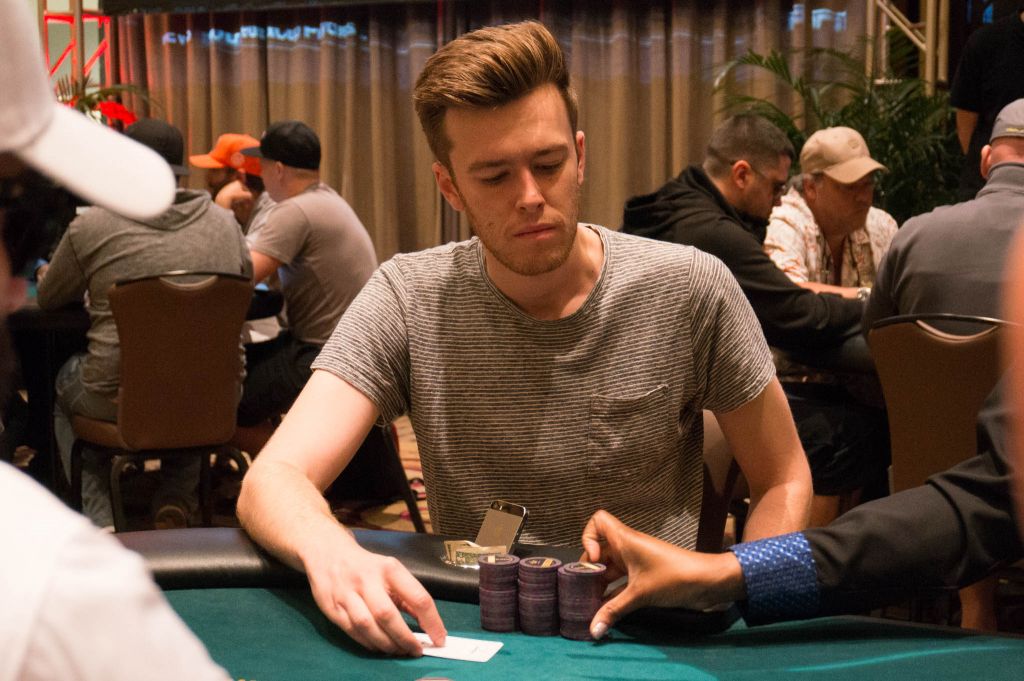
On Sunday, nine of the world’s best poker pros will take to the table for the main event of the World Series of Poker, the highlight of the globe’s largest annual gathering of players with an $8 million prize. One of those nine—Gordon Vayo—has been working up to this moment for the majority of his life. Now 27, Vayo got his start as early as 17, when he was already making more money than both of his parents combined, skipping school just to compete. But his journey to the top has had its share of lows.
“You don’t have to be a math genius,” Vayo tells TIME. You just have to be “pretty competitive.” Anything else? “You need that killer instinct.”
Growing up in suburban Bloomington, Illinois with musician parents, Vayo isn’t exactly a denizen of some secret poker underworld. Neither is he a “nerdy kid,” although some members of his generation of online poker players revel in that title. Vayo first became enamored with the game when he watched televised tournaments of the World Series in his early teens, by high school he was regularly playing hooky to compete online (against the wishes of his parents, of course). He racked up enough cash to buy a BMW and rent an apartment where he could throw parties, but not without without consequences. Just a few weeks before graduation, he was called to his principal’s office—and was expelled for skipping class.
Somewhat devastated (and diploma-less), Vayo bet big on his future with poker. He drove straight to Vegas, he said, and then headed to Europe. He was 18, and had already been ranked number 15 in the world, earning over a million dollars.
“Online is a very technical game; it’s all game-theory-oriented,” he explained. “Live, you have to deal with the human element. It’s very reactive.” And intuitive. At his first big game in Barcelona, he started realizing the importance of image. While with online poker Vayo could play multiple low-stakes games at a time, hedging his bets, live games required more substantial buy-ins… and correspondingly larger payouts.
“Prestige,” he added, “comes from doing well in live circuits.” And he did well. “I had no concept of the value of money,” he explained. That all came to a head when he started playing with a friend. Together, they thought they were “untouchable,” and at one point he took in nearly $700,000 in just a few heady days, he says. The pair gallivanted around Europe, ordering caviar room service and renting a villa in Corfu.
Then Vayo lost almost a million dollars in six short weeks, he tells TIME.
He headed back home to Illinois broke, in debt, and still without even a high school diploma; the story has echoes of Matt Damon’s Rounders. He felt “robbed,” he said, and spent six months playing small online games, trying to repay his debts and rebuild his capital. He was finally on the up when, in 2011, that route to success also came crashing down on him: federal authorities cracked down on the unregulated online gambling market. From offering a potentially sustainable income of up to $250,000 a year for good players like Vayo, the new regulations made it hard to legally take in more than $60,000 annually from online games at popular sites like PokerStars.
“Poker has a way of checking your ego like nothing else,” he adds. Many of his poker friends moved abroad. Vayo, meanwhile, moved to San Francisco and doubled down on live tournament play, playing online occasionally.
His profession is not, he warns, as glamorous as Casino Royale makes it out to be. “The majority of your life is spent in dark rooms,” he explains. Sure, they get to play in ritzy casinos in Monte Carlo. There’s the caviar, and the Greek villa. But there’s also the “daily grind” of it, an isolating and unpredictable life path.
On Sunday evening, at this year’s World Series of Poker, Vayo will take to the top table as one of the final “November Nine.” He’s the youngest in the group. But he’s no rookie, and lately he’s even been on a roll, taking home $587,120 and the top prize at a tournament last month. After bottoming out, the even-keeled Vayo knows how to bounce back.
His advice for aspiring professional poker players? “You have to be OK with losing money,” he recommends.
More Must-Reads From TIME
- The 100 Most Influential People of 2024
- The Revolution of Yulia Navalnaya
- 6 Compliments That Land Every Time
- What's the Deal With the Bitcoin Halving?
- If You're Dating Right Now , You're Brave: Column
- The AI That Could Heal a Divided Internet
- Fallout Is a Brilliant Model for the Future of Video Game Adaptations
- Want Weekly Recs on What to Watch, Read, and More? Sign Up for Worth Your Time
Write to Raisa Bruner at raisa.bruner@time.com